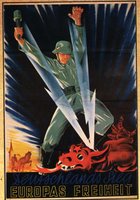 It is when we do plays like A Bright Room Called Day, that I realize my degree in Political Science is not completely wasted. While it is important to not simply look at Bright Room as some sort of historical document isolated from the world that we live in, it is also necessary as artists and audience to be aware of some of the realities of the state of German Affairs in the 1930s.
It is when we do plays like A Bright Room Called Day, that I realize my degree in Political Science is not completely wasted. While it is important to not simply look at Bright Room as some sort of historical document isolated from the world that we live in, it is also necessary as artists and audience to be aware of some of the realities of the state of German Affairs in the 1930s.It is easy when anyone does a project involving the word Nazi, to simply reduce the ideas of Nazism to the Holocaust and Hitler. It makes people feel safe and cozy to think that those things are in the past. As time moves on and we get further and further from the events of World War II and the horrors inflicted on all the peoples of Europe, it seems many people forget that the Nazis and Hitler didn't just show up one morning and start running Germany. They started as a political party with a message that appealed too many of the German people. Ideas like national pride and fighting the threat from without and within.
Germany was still suffering economic and political instability after their loss of World War I
 fifteen years before the events of Bright Room. Assassination, revolution and poverty were the order of the day in Germany during the intervening years between the wars. It was threats of this sort of terrorism that led many people to seek an alternative to what was perceived as the Weimar Government's ineffectuality and capitulation to the demands of the victorious European Powers. Imagine inflation during the 1920s that had 10,000,000 marks equaling 1 American Dollar. You would need a wheelbarrow full of marks to buy a loaf of bread. To the left you see children standing next to a stack of nearly worthless mark notes.
fifteen years before the events of Bright Room. Assassination, revolution and poverty were the order of the day in Germany during the intervening years between the wars. It was threats of this sort of terrorism that led many people to seek an alternative to what was perceived as the Weimar Government's ineffectuality and capitulation to the demands of the victorious European Powers. Imagine inflation during the 1920s that had 10,000,000 marks equaling 1 American Dollar. You would need a wheelbarrow full of marks to buy a loaf of bread. To the left you see children standing next to a stack of nearly worthless mark notes.And so what happens when you are hungry and you don't know who will be in charge as leaders are killed or deposed? You lash out and things that you thought you would never sacrifice go out the window as you look for a little security in a world where no place seems safe. And if you are a politician with a thirst for power you exploit that fear.
You use the uncertainty to bring people to your cause. And not just the working masses, but
 intellectuals, war heroes and artists. You use the media and popular culture to carry your message of the threat of foreign governments and internal threats. You use the state's mechanisms to spy on its own citizens and ask neighbors to spy on neighbors. You put your opposition in jail and eventually build up your national defenses to spark a lagging economy.
intellectuals, war heroes and artists. You use the media and popular culture to carry your message of the threat of foreign governments and internal threats. You use the state's mechanisms to spy on its own citizens and ask neighbors to spy on neighbors. You put your opposition in jail and eventually build up your national defenses to spark a lagging economy.And this is the world that surrounds the events of A Bright Room Called Day. A story where a group of idealists and artists slowly watch their nation slip under the spell of an Austrian with a penchant for public speaking.
No comments:
Post a Comment